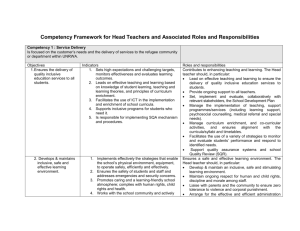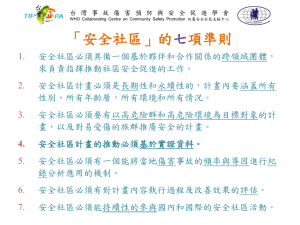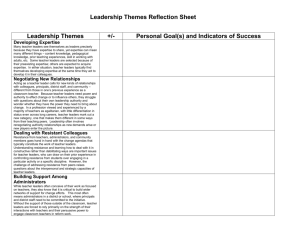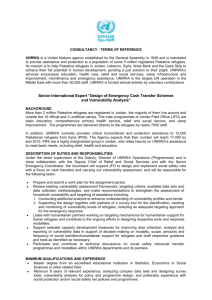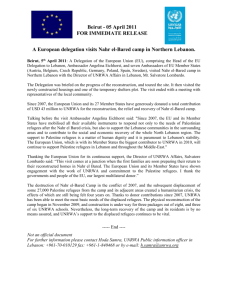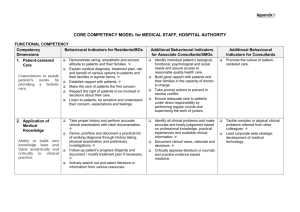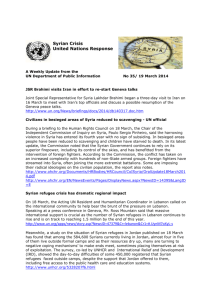Teachers objectives and indicators
advertisement
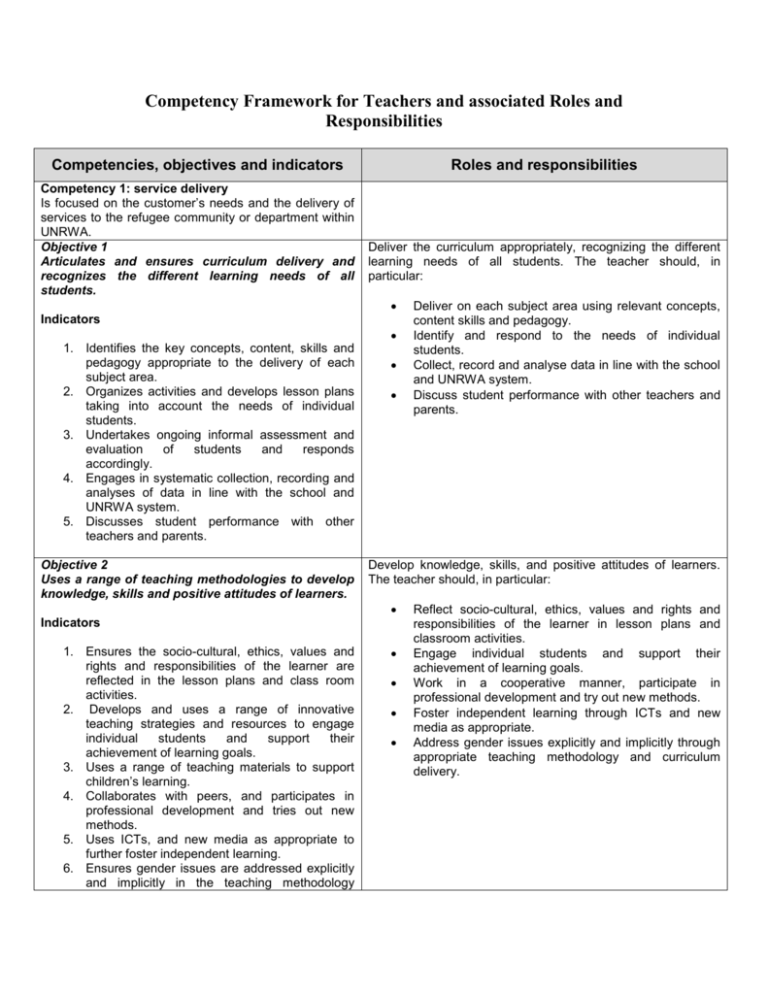
Competency Framework for Teachers and associated Roles and Responsibilities Competencies, objectives and indicators Competency 1: service delivery Is focused on the customer’s needs and the delivery of services to the refugee community or department within UNRWA. Objective 1 Articulates and ensures curriculum delivery and recognizes the different learning needs of all students. Roles and responsibilities Deliver the curriculum appropriately, recognizing the different learning needs of all students. The teacher should, in particular: Indicators 1. Identifies the key concepts, content, skills and pedagogy appropriate to the delivery of each subject area. 2. Organizes activities and develops lesson plans taking into account the needs of individual students. 3. Undertakes ongoing informal assessment and evaluation of students and responds accordingly. 4. Engages in systematic collection, recording and analyses of data in line with the school and UNRWA system. 5. Discusses student performance with other teachers and parents. Objective 2 Uses a range of teaching methodologies to develop knowledge, skills and positive attitudes of learners. Develop knowledge, skills, and positive attitudes of learners. The teacher should, in particular: Indicators 1. Ensures the socio-cultural, ethics, values and rights and responsibilities of the learner are reflected in the lesson plans and class room activities. 2. Develops and uses a range of innovative teaching strategies and resources to engage individual students and support their achievement of learning goals. 3. Uses a range of teaching materials to support children’s learning. 4. Collaborates with peers, and participates in professional development and tries out new methods. 5. Uses ICTs, and new media as appropriate to further foster independent learning. 6. Ensures gender issues are addressed explicitly and implicitly in the teaching methodology Deliver on each subject area using relevant concepts, content skills and pedagogy. Identify and respond to the needs of individual students. Collect, record and analyse data in line with the school and UNRWA system. Discuss student performance with other teachers and parents. Reflect socio-cultural, ethics, values and rights and responsibilities of the learner in lesson plans and classroom activities. Engage individual students and support their achievement of learning goals. Work in a cooperative manner, participate in professional development and try out new methods. Foster independent learning through ICTs and new media as appropriate. Address gender issues explicitly and implicitly through appropriate teaching methodology and curriculum delivery. adopted and the delivery of the curriculum. Competency 2: knowledge and understanding Has the appropriate knowledge to accomplish assigned duties and seeks out knowledge to improve performance and to understand the purpose of the mission of the Agency and its importance to the recipients of services. Objective 3 Has appropriate level of knowledge and understanding of the subjects he/she teaches and the teaching methodology and is open to new ways of working. Indicators 1. Selects, sequences and teaches content that motivates students to develop literacy and numeracy and achieve learning goals. 2. Seeks and accepts constructive feedback from colleagues and students to improve their own professional knowledge and identify areas for continuing professional learning. 3. Facilitates promotion of human rights including child’s rights and responsibilities in the school and community. 4. Organizes activities relevant to current health issues of the child and the community and handling emergencies. 5. Networks with other teachers and staff and organizes extra curricular activities to support the holistic development of the child. 6. Identifies and participates in action research and professional learning and updates his/her knowledge and practice for positive impact on teaching and learning. Competency 3: attitude and integrity Displays a positive attitude towards work, colleagues, the refugee community and the United Nations, and conducts all duties with the highest level of ethics and honesty. Objective 4 Establishes and maintains an environment where staff and students are treated with courtesy, respect, integrity, justice, empathy and dignity. Indicators 1. Complies with codes of ethics and conduct established by UNRWA authorities, systems and schools to maintain harmonious, nondiscriminatory and professional relationships with the students, colleagues and parents. 2. Adopts innovative approaches in dealing with gender, discrimination and violence through collaboration with peers. Accomplish assigned duty through appropriate knowledge and understanding of the Agency’s mission, the subjects s/he teachers, and the teaching methodology, and openness to new ways of working. The teacher should, in particular: Motivate students to develop literacy and numeracy and achieve learning goals. Support the holistic development of the child. Improve his/her own professional knowledge by seeking and accepting constructive feedback. Participate in action research and professional learning. Promote human rights including child’s rights and responsibilities in the school and community. Contribute to addressing current health issues of the child and community and handling of emergencies. Ensure staff and students are treated with courtesy, respect, integrity, justice, empathy and dignity. The teacher should, in particular: Maintain harmonious, non-discriminatory and professional relationships with students, colleagues and parents in compliance with UNRWA codes of ethics and conduct. Address gender, discrimination and violence issues in collaboration with peers. Ensure that school is a safe and secure environment. Engage with the school and community on key social, environmental, health, child rights and protection issues. 3. Works within school, system and agency requirements and collaboratively with others to ensure that school is a safe and secure environment. 4. Takes a proactive role in mobilizing school and community members and undertaking joint activities on key social, environmental, health issues, and child rights and protection. Competency 4: relationships Develops and maintains good relationships with subordinates, peers, superiors and external people and agencies of interest. Objective 5 Establishes and maintains positive and proactive relationships and networking with all relevant stakeholders. Indicators 1. In collaboration with others and working with parents, undertakes appropriate guidance and counseling activities. 2. Actively networks with the key players (schools, NGO’s, community leaders, Governmental agencies) towards the developmental activities of the school. 3. Contributes to the school policy level discussions and action. 4. Initiates and/or participates in school activities that provide opportunities for respectful and collaborative relationships with parents. Competency 5: leadership and management Ensures appropriate allocation of work to staff and use of resources, motivates staff, and provides adequate direction for accomplishing the mission of the Agency. Objective 6 Manages the learning processes, contributes to the school as a whole, and takes responsibilities within the school for specific areas – curricular or cocurricular as appropriate. Indicators 1. Works as a team member, adhering to the school systems and ethos. 2. Establishes and implements routines and practices to manage resources and physical space to maximize students’ time on learning. 3. Collaborates with colleagues and engages in the selection or development of systems to collect, organize and store information to contribute to more effective teaching and learning. 4. Initiates and maintain links with the wider education community and other Programmes of the Agency to improve the performance of Engage with relevant stakeholders positively and in a proactive manner. The teacher should, in particular: Provide appropriate guidance and counseling. Contribute to school development and school policy level discussion and action. Develop respectful and collaborative relationships with parents. Contribute to the mission of the Agency and school as a whole. The teacher should, in particular: Work as a team member, adhering to the school systems and ethos. Manage resources and physical space to maximize students’ time on learning. Contribute to the collection, organization and storing of relevant information. Contribute to the improvement of the performance of students and school through appropriate links with the wider education community and other programmes. students and the whole school.
